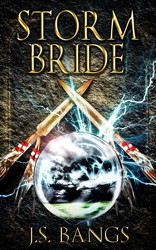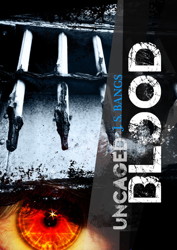
Last week, here in the greater Philadelphia area, we were all battening down the hatches for this year’s version of the “Snowpocalypse.” But it didn’t happen. Instead of dumping two feet of snow on us, winter storm Juno came in and went out on the same night, continuing along its eastward path to a much greater distance than the models had suggested, and leaving us with a disappointing four inches. Okay, sure, it then headed north and proceeded to hammer Boston, but that’s just for karma’s sake so I don’t get snowed in there in two weeks during Boskone. All in all, I’m a bit disappointed, though it has been pretty cold the last few days, so I guess that counts as something.
And now, this is the point where I manage a lame segue, probably something about how EATING AUTHORS is here to warm you up (yeah, that’ll work), and introduce you to this week’s guest, J.S. Bangs.
I’m really happy to have J.S. (aka Jesse) here, and not just because his first novel, Storm Bride, only recently came out from Red Adept, but also because he has a degree in linguistics and admits to inventing languages. That’s a rare quirk, and there’s a sacred bond between those of us who have fallen down that particular rabbit hole. As you’ll quickly infer as you read his account below, he speaks Romanian, but surely it’s only a matter of time before I manage to lure him over to joys of Klingon.

LMS: Welcome, Jesse. Congratulations on the release of your first novel. But enough about books, let’s get to the food. Tell us about your most memorable meal!
JSB: In the last days of 2004 I returned from a year in Romania to my parents’ house in Minnesota. My greatest treasure from that year I had to leave in Romania, since I couldn’t clear it through customs at the time, but my second greatest treasure was nestled in a plastic grocery bag in the heart of my luggage. When I arrived home, I pulled it out of the bag and laid it triumphantly on the kitchen counter for everyone in my family to see: a wide-mouth jar with a dented lid and a torn label advertising some Eastern European brand of pickles, containing not pickles but cheese.
This was homemade Romanian sheep cheese, prepared in a fashion which I imagine is only lightly changed from how Mihai Eminescu’s mother made sheep cheese. You go to the market and buy a wheel of fresh cheese, which at that point may only be a few days old. Fresh Romanian sheep cheese is spongy and tart, with a flavor that isn’t unpleasant but barely hints at the heights which are to come, which is why you have to prepare it. You take it home and put it into the biggest bowl you have. Then you crumble it into bits, adding an enormous amount of coarse salt, and pack the crumbled cheese with your fist into the largest jars you have. (It is not necessary that the jars be labeled for Eastern European brands of pickles, but it does add to the authenticity.) Finally, you add a little more salt to the top, seal the lid tight, and put it in the back of the cupboard to age.
By the time I returned to America, my jar of sheep cheese had been aging for several weeks. When I cracked the lid open, the cheese was just as desired: a crust of crystallized salt had formed across the top, proof that the salt content was high enough and the jar had sat long enough to perfect its contents. When I scraped off the top layer of salt I revealed the pungent, yellowing, savory, softened, ripened beauty beneath, and showed it to my family in pride.
My mother took one whiff of the stuff and refused to taste it. I didn’t fare much better with the rest of the family.
From the amount of salt added, you may surmise that a home-ripened sheep cheese like this is very salty. From the fact that the cheese is kept for weeks at room temperature, you might further guess that it’s pretty ripe (though not as ripe as it would be if you skimped on the salt). But these characteristics together create an incredibly potent taste and smell which crown any dish. The nearest comparison I can make is to a good feta, which is likewise strong and salty, and crumbles well over salads, soups, potatoes, or pizzas.
But I was told to discuss a meal, not just a cheese. So picture this meal: boiled new potatoes in a little porcelain dish, drizzled with oil, and finished with generous crumbles of sheep cheese and a spoonful of creamy Romanian smântâna. I’m eating this at 10:00 pm in a homey Romanian kitchen in a Communist era apartment block, sitting on a battered stool and enjoying it more than almost anything I’ve ever eaten. I can’t attach a date to this scene, because it occurred on more nights than I could remember during that year in Romania, but the food’s unpretentious simplicity, its novelty to me, my hunger, and the delightful company have etched these meals in my memory as some of the most enjoyable I’ve ever had.
Ah, yes, the company. See, the jar of sheep cheese that I took back from America was prepared for me by my mother-in-law, and those first meals occurred in her kitchen. She wasn’t there, though, and neither was she yet my mother-in-law, because the person eating with me was my fiancee. I married her just before returning to the states, but was forced to leave her in Romania for reasons of paperwork. She was the treasure which I couldn’t get through customs at the time, but fortunately the paperwork was resolved a few months later, and we have now been together for ten years.
We haven’t found a way to make good home sheep cheese in America, but every now and then someone visiting from the old country sneaks a jar from my mother-in-law into their luggage. It doesn’t last long once it reaches me.

Thanks, Jesse. Ripe, salty cheese and conlang! I knew I liked you for a reason.
Next Monday: Another author and another meal!
#SFWApro
Tags: Eating Authors



I remember you and your wife being foodies!Â
So glad to read this.Â
From one Shining Creamsicle to the next. 😉
02.12.15 at 10:54 pm